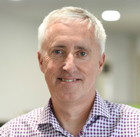Swegon highlights time’s up for F-Gas

The 1st January 2018 is fast approaching and it is an important date because, following the EU's new regulations on F-Gases, it is when the first significant cut in the supply of HFCs happens - a huge 37%.
As a direct result, with many refrigerant manufacturers already reducing production of older HFCs, costs for HFC refrigerants have soared.
The proposed phase down will eventually lead to a massive 79% cut in the quantity of HFCs available on the market by 2030, which is only 13 years’ time. With the typical life expectancy of a chiller around 15 years, this becomes an issue when specifying a new chiller.
Andy Legg, Swegon’s Cooling Product director, says: “Swegon have been prepared for these regulations for some time, with compliant units already introduced into Switzerland back in 2014, due to Government legislation there. Swegon’s BlueBox Kappa Rev LGW range of air cooled screw chillers was in fact the first to be Eurovent certified, using an HFO refrigerant known as R1234ze. R1234ze has a GWP of 0.9 and is available in chillers ranging from 250kW to 1000kW”.
Swegon’s BlueBox range of chillers are available with integrated free cooling, which offers the most environmentally friendly cooling solution for applications with year-round demand. Testing of these chillers has also shown an 8% improvement in energy efficiency.







